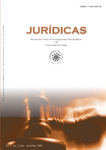Authors
Abstract
This article will try to explain what is meant when using the words “law” or “norm”. It will be said that the law is not an empirical fact, and that norms are not propositions that refer to the world; this being one of the reasons why defining the concept of law is difficult. This issue leads to studying some theories that have the intention of solving this disagreement, and show that within the legal practice the theoretical base of legal decisions is the formalist theory of law, which originates a unreasonable answer concerning the definition of law, by means of the judicial syllogism.
Keywords
References
ATIENZA, Manuel. (1993). Tras la justicia. Barcelona: Ariel.
________. (1998). Derecho y argumentación. Colombia: Editorial Universidad Externado.
________. (2000b). Introducción al derecho. México: Distribuciones Fontamara.
________. (2003). Las razones del derecho. México: Universidad Nacional Autónoma.
________. (2004). Cuestiones judiciales. México: Distribuciones Fontamara.
ATIENZA, Manuel & MANERO R. J. (2000a). Ilícitos atípicos. Madrid: Trotta.
HART, H. L. A. (2004). El concepto de derecho. Buenos Aires: Abeledo Perrot.
HERNÁNDEZ MARÍN, R. (2005). Las obligaciones básicas de los jueces. Madrid: Marcial Pons.
KANT, Immanuel. (1995). Crítica de la razón pura. México: Alfaguara.
KELSEN, Hans. (1998). ¿Qué es la teoría pura del derecho? México: Distribuciones Fontamara.
NARVÁEZ MORA, M. (2004). Wittgenstein y la teoría del derecho. Madrid: Marcial Pons.
NIETO, Alejandro. (2004). El desgobierno judicial. Madrid: Trotta.
________. (2007). Crítica de la razón jurídica. Madrid: Trotta.
NINO, Carlos Santiago. (1994). Derecho, moral y política. Barcelona: Ariel.
________. (2005). Introducción al análisis del derecho. Buenos Aires: Astrea.
SEARLE, Jhon R. (1997). La construcción de la realidad social. Barcelona: Paidós.
VÁSQUEZ, Rodolfo. (2003). Derecho y moral. Barcelona: Gedisa.
WITTGENSTEIN, Ludwig. (2005). Tractus lógico-philosophicus. Madrid: Alianza.

 PDF (Español)
PDF (Español)
 FLIP
FLIP





















